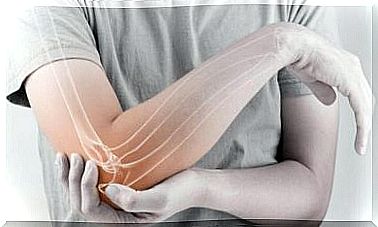9 Symptoms That Indicate The Presence Of Parasites In The Body
In addition to the typical symptoms, parasitic infections can cause other symptoms or health problems that are not always associated with these micro- organizations. Do you know them. We tell you here what these symptoms are.

Many people think that the human body is not very prone to parasitic invasions. And that this only happens in the poorest countries of the world. In fact there are currently 3 billion people who are infected with parasites in the body, according to estimates by the World Health Organization (WHO).
Depending on their nature, parasites can for example feed on red blood cells. And thus cause anemia, or eat food ingested, and cause undernutrition. They can also prevent the body from eliminating toxins that it may have accumulated.
According to information disclosed by the Centers for Disease Control and Prevention (CDC) , the root causes of the presence of parasites in the body are contact with infected animals, consumption of contaminated food or water, and bites of ‘insects .
In any case, once the body is infected, many symptoms appear which can gradually worsen when left untreated. It is therefore important to know what these symptoms are and to consult a doctor after identifying them.
Symptoms that indicate the presence of parasites in the body
First of all, it should be noted that parasites are organisms that live and feed on our body. The most common are intestinal parasites. These lodge in the small intestine or in the large intestine. It is important to clarify that there are many types of parasites. Therefore, the symptoms of a parasitic infection can be very varied.
In all cases, it is important to be attentive to any clinical manifestation, especially when one has been in contact with a source of contamination, whether it is a pet or a contaminated food. , a risk area, etc.
1. Sleep disorders
As you probably know, sleep disturbances can be caused by physical and emotional conditions that directly affect a decrease in melatonin. Although there are various reasons that could explain your difficulty sleeping, do not overlook the possibility that there is a parasite in your body.
According to research published in Journal of Immunology Research , these microorganisms can alter sleep patterns, either through the immune response or through direct effects. Concretely, the triggers could be:
- insomnia
- sleep disturbance
- bedwetting (involuntary urination)
- teeth grinding during the night

2. Skin problems
Many ailments that affect our body have repercussions on our skin, and can then cause various alterations. It is therefore essential to take this information into consideration.
In fact, a study published in the North Carolina Medical Journal suggests that physicians should be aware of the skin manifestations of parasitic diseases in order to intervene effectively by offering appropriate treatment. Possible symptoms include the following:
- ulcers
- eczema
- dry skin
- urticaria
- pimples and rashes
3. Fatigue
Some of these microorganisms can weaken us and cause nutritional deficiencies. Consequently, they can trigger episodes of intense fatigue or even a strong feeling of exhaustion, thus preventing us from leading a normal life.
4. Irritable bowel syndrome
Irritable bowel syndrome is a condition characterized by abdominal pain, distension and severe constipation.
Although we do not have an explanation of the real causes of this disorder, it could be strongly linked to the presence of parasites in the body.
Moreover, a study published in World Journal of Gastrointestinal Pharmacology and Therapeutics concluded that there was a major prevalence of parasites such as Blastocystis, Cryptosporidium and Giardia in patients who suffer from irritable bowel syndrome.
In addition, this study suggests that these parasites may play an important role in the pathogenesis of IBS. Nonetheless, further studies are needed to confirm this.
5. Digestive problems
As the researchers of this research published on Parasite Immunology observe , these microorganisms cause a lot of damage in the intestinal lining. Its role is of course to absorb the nutrients present in food, in order to carry out the digestive process.
By generating an alteration of the cells that compose it, the parasites can cause digestive disorders such as:
- abdominal inflammation
- difficulty digesting
- frequent stomach pain
- food allergies or intolerances
6. Anemia
Some cases of anemia can be the result of a parasitic infection. According to a study published in The American Journal of Clinical Nutrition, the parasites that cause blood loss and lead to anemia are:
- intestinal worms ( Trichuris trichiura)
- hookworms ( Necator americanus and Ancylostoma duodenale)
- schistosomes (Schistosoma mansoni, S. haematobium and S. japonicum )
7. Loss of control over body weight
In our modern society, losing weight for no apparent reason is considered a blessing. However, it can hide the presence of a serious problem caused by parasites in the body. As a study published in Archives of Medical Science reports , parasitic problems in childhood are associated with anemia, anorexia, lack of appetite, stunted growth and development.
Moreover, these problems are also associated with alterations in the secretion of leptin and adiponectin. The sum of these factors is related to alterations in body mass index and excessive weight loss.
8. Mental imbalances
When these pathogens invade our body, they can affect the mental processes that take place there, as well as the functioning of the nervous system.
As a study published in Journal of Food Protection reports , some foodborne parasites, such as Taenia solium and Toxoplasma gondii, can affect mental health by directly infecting the brain.
This study explains that parasites can promote mental illness via the immune system or by influencing neurotransmission pathways. Those affected may have the following symptoms:
- depression
- nervousness
- stress and anxiety
- mood swings
- memory loss
9. Problems related to reproductive organs
Parasitic infections can also be linked to reproductive problems such as infertility. In a systematic review published in 2016 on Parasitology Research, it was pointed out that these infections, especially those caused by protozoa, can be at the origin of infertility via the deterioration of the male and female reproductive systems.
When to see your doctor?
When the symptoms of a parasitic invasion appear, it is essential to consult a doctor promptly. In addition to the symptoms mentioned, other common manifestations may occur: diarrhea, vomiting, fever, anal itching and abdominal pain.
Whatever the case, the doctor must carry out a series of examinations in order to establish a good diagnosis and thus choose the appropriate treatment.









